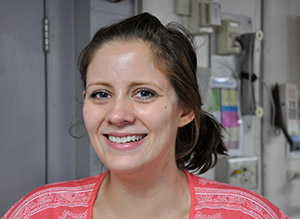Ashley Grosche, Graduate Student, Rutgers University
 Ashley Grosche, Graduate Student,
Ashley Grosche, Graduate Student,
Rutgers UniversityHow did you first get interested in microbiology?
I had a great microbiology professor in college, but I think the microbes themselves were the really interesting part. It was amazing to learn what’s out there. You don’t realize the diversity of microbes until you take a class like that, I guess—you just think everything is a “germ,” but they’re not! I think that’s when I learned the potential of this whole unseen world I didn’t know about before.
What about your focus on marine microbes?
Growing up, my grandpa was in the Navy, and in high school, we moved to a lake in northwest New Jersey, so I’ve always had an appreciation for the water. I had actually gone to trade school for hairdressing, for cosmetology, and was actually a certified hairdresser. It was vocational high school, a trade school, but my junior and senior year, a couple of things happened. One is that I had a fantastic biology teacher who realized I was actually good at science, and gave me free range of her chemical closet—which in hindsight was probably not the best idea, but she just said “do whatever experiment you want, but run it by me first.” So I really developed a curiosity about all these different types of reactions I was seeing. When you’re given free range like that, you start seeing all the possibilities, and you realize that science isn’t a closed box. I think for a long time in grade school, that’s how a lot of people think it is—that science is just what’s written in the books.
The second great thing that happened was when my family moved to the lake, and I had this whole habitat in front of me. I thought it was amazing, and I realized that’s what I wanted to study.
So this was your first time at sea—what was it like leading up to the trip?
It was really exciting. I think I nagged Costa [Vetriani] and Donato [Giovannelli] almost every day for the month leading up to the trip. What should I bring? There’s only 19 days left! They were probably really sick of hearing about it.
What’s it been like for you so far?
I’ve never been at sea this long, but I’ve spent a month away from home before, and it’s actually kind of similar. I like being at sea. I don’t get seasick, and in a lot of ways, I feel a lot closer to my grandpa out here. He passed away when I was in high school, but I feel some of the experiences I’m having out here help me understand what he went through in the Navy, so it’s a really cool feeling.
So what’s next? Does most of your work start when you get back to the lab?
Most of the work on my Ph.D. thesis is going to be on biofilm formation and growth [see our January 7 dispatch to learn more about biofilms]. Biofilms have been studied pretty well before—as in, how they form, how they age, and how some of the microbes within them revert back to free-swimming bacteria—but they haven’t been studied all that much at deep-sea vents.
Biofilms there are pretty important, because they allow microbes to attach to a surface and get nutrients. We want to figure out a few things about them. First of all, what triggers bacteria to go into that lifestyle? Is it the density of the bacteria that does it? What genes are involved when the bacteria are making the transition into creating a biofilm? We’ll look for genes that are involved in attachment, or the secretion of sticky substances that let the microbe attach to a surface.
There’s also restructuring—as the biofilm grows and ages, it has to restructure itself to get a flow of nutrients through it. Think of it like a block of Swiss cheese, but in this case the holes inside are constantly moving around to let nutrients flow through.
Once you start learning about this, do you just start seeing biofilms everywhere?
Yeah, it definitely makes you want to brush your teeth a lot more. I’m not a big germophobe, though. I know some people that study this stuff and then wash their hands 20 times a day. I think that might do more harm than good, though—you’ve got a natural bacterial community living on your skin, and it outcompetes a lot of the other stuff that might try to settle down and cause an infection. If you over-wash, you leave open land for invasion.
It must be weird to start seeing the world through that lens—knowing what’s happening everywhere on a microscopic level.
I think you just understand the world around you more, and have a better sense of why certain things happen. You constantly feel the effects of microbes, because they’re always there. When you get sick, for example, you start thinking, aggh, stupid microbes! Or if you get a cavity, same thing. You have a totally different appreciation for what’s going on.
So are you feeling ready for the next cruise?
Yeah, I think so. I actually really like being at sea. It’s very soothing, first of all. It makes me want to sleep all the time because of the rocking of the ship. I also like the fact that you can focus completely on your work. You wake up, you go upstairs, your lab is right there. You want to exercise, the elliptical machine is just down the hall; you want to do laundry, it’s right there too. Same thing with meals. It’s pretty cool— I would definitely do it again.
[Back
to top]
|

